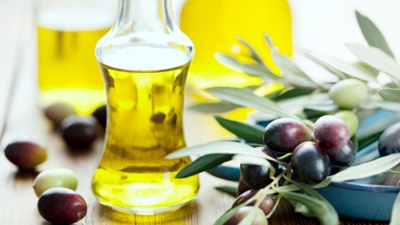
The highest quality extra virgin olive oil can definitely benefit any healthy diet. You might know olive oil as a well-established member of the Mediterranean diet, which contributes to decreasing the risk of diseases such as dementia, cancer, and cardiovascular disease. Researchers have also found that people living on the Crete island in Greece have a high-fat diet and also a low rate of heart disease. Olive oil is a main component of the island’s diet.
Health Benefits of Olive Oil
I personally use extra virgin olive oil with many meals and it has a distinctly tasty flavor as well. When you add it to your meal you can obtain the benefits of olive oil. Extra virgin olive oil is considered the least refined olive oil. It is known to retain the most nutrients such as the antioxidants, oleuropein, and hydroxytyrosol. The large list of antioxidant phytonutrients includes many key polyphenols such as simple phenols, terpenes, hydroxycinnamic acids, flavonols, and lignans. The polyphenols are a natural component to help lower the risk of certain cancers, another one of the benefits of olive oil.
The health benefits of olive oil are also derived from the healthy monounsaturated fat content such as oleic acid, which contributes to anti-inflammatory effects linked to lower rates of chronic conditions. The list includes diabetes, atherosclerosis, heart disease, colon cancer, and asthma.
Also, there have been studies indicating that extra virgin olive oil helps with cell formation, membrane development, and cell differentiation. It is also linked with improving brain maturation and function, blood sugar regulation, and weight control.
However, it is very difficult to obtain the many benefits of olive oil listed above unless it is prepared in the proper way. You want to find the best olive oils available that are not highly processed. Cooking with olive oil is also a challenge if you want to retain all the benefits of olive oil.
How to Select Olive Oil
Cold-pressed extra virgin olive oil is the only one that should be in your shopping cart, and still, finding the right one can be a difficult task. The quality of olive oil is deteriorated when it is refined, processed, heated, and bleached, and it can no longer be labeled as “virgin.”
Unrefined extra virgin olive oils contain more than 80% fatty acids that are protective, unheated, and are mostly monounsaturated with some unsaturated fat. The unsaturated fatty acids will not only lose their protective effects when heated above 150 °C (302 °F), they experience nutrient losses and molecular changes, and they also become mutagenic. Your extra virgin olive oil will not exceed above 150 °C, and a lot of the better brands won’t even exceed 30 °C. This also helps maintain the oil’s aroma and signature taste.
The heart-protecting effects will solely depend on whether the extra virgin olive oil is unrefined. From my experience, the best extra virgin olive oil will be stored in a dark glass bottle, which blocks the oil from heat, light, or oxygen. The dark bottles will also protect the oil from oxidation caused by light exposure. Lightly tinted bottles will become rancid at a quicker rate.
The olive oil brand I use is a certified organic product from Greece called Silver Leaf. The exact address where it’s made is listed on the label, ensuring authenticity. There are other similar cold-pressed extra virgin olive oils on the market.
You should be aware that the United States Department of Agriculture (USDA) doesn’t regulate the use of the term “extra virgin.”
You must be aware of olive oils on the market because there are no olive oil labeling laws in regards to the term “extra virgin” (especially be aware of very cheap sales on extra virgin olive oil, as companies may use the label to entice customers).
Cooking with Olive Oil
Should you be cooking with olive oil? If you do, it is best to limit the oil’s exposure to oxygen by immediately putting the lid on the bottle after use. Oxygen and sunlight both contribute to denaturing your olive oil when left sitting out.
The best way to obtain the health benefits of olive oil is not by cooking with olive oil but instead by drizzling it onto your salad or after your pasta dish is already complete. When cooking with olive oil at high temperatures (above 150 °C or 302 °F) the oxidation of nourishing substances and acrylamide formation can occur. It is best not to heat olive oil past its smoke point (this ranges between 220-437 °F).
When cooking with olive oil (such as a natural, high-quality extra virgin olive oil), you don’t want to heat it above 200-250 °F.
Cooking with olive oil can lose some of the benefits and other oils like avocado oil, tea seed oil, red palm oil, or safflower oil fare much better for cooking.
I personally use avocado oil, which has a smoke point of approximately 520 °F. It is delicious in anything from pasta to baked pizza crust. The high quality avocado oils and extra virgin olive oils are close in price, about $20-$30.
Any oils containing omega-3 and omega-6 fatty acids should be stored in smaller bottles and somewhere cool such as the fridge or a cold cellar. This will allow your essential fatty acid to avoid oxidation.
The FoodsForBetterHealth Bottom Line
There are many significant benefits of olive oil; however, cooking with olive oil could present its challenges. If you’re worried about the fat content in extra virgin olive oil, don’t be. It’s one of the healthiest fats for your food when prepared properly. Even eating a daily spoonful would help you get the benefits of olive oil.
Related:
Sources:
“Is it OK to cook with extra-virgin olive oil?” The World’s Healthiest Foods web site; http://www.whfoods.com/genpage.php?tname=george&dbid=56, last accessed March 1, 2014.
“Olive oil, extra virgin,” The World’s Healthiest Foods web site; http://www.whfoods.com/genpage.php?tname=foodspice&dbid=132, last accessed March 1, 2014.













